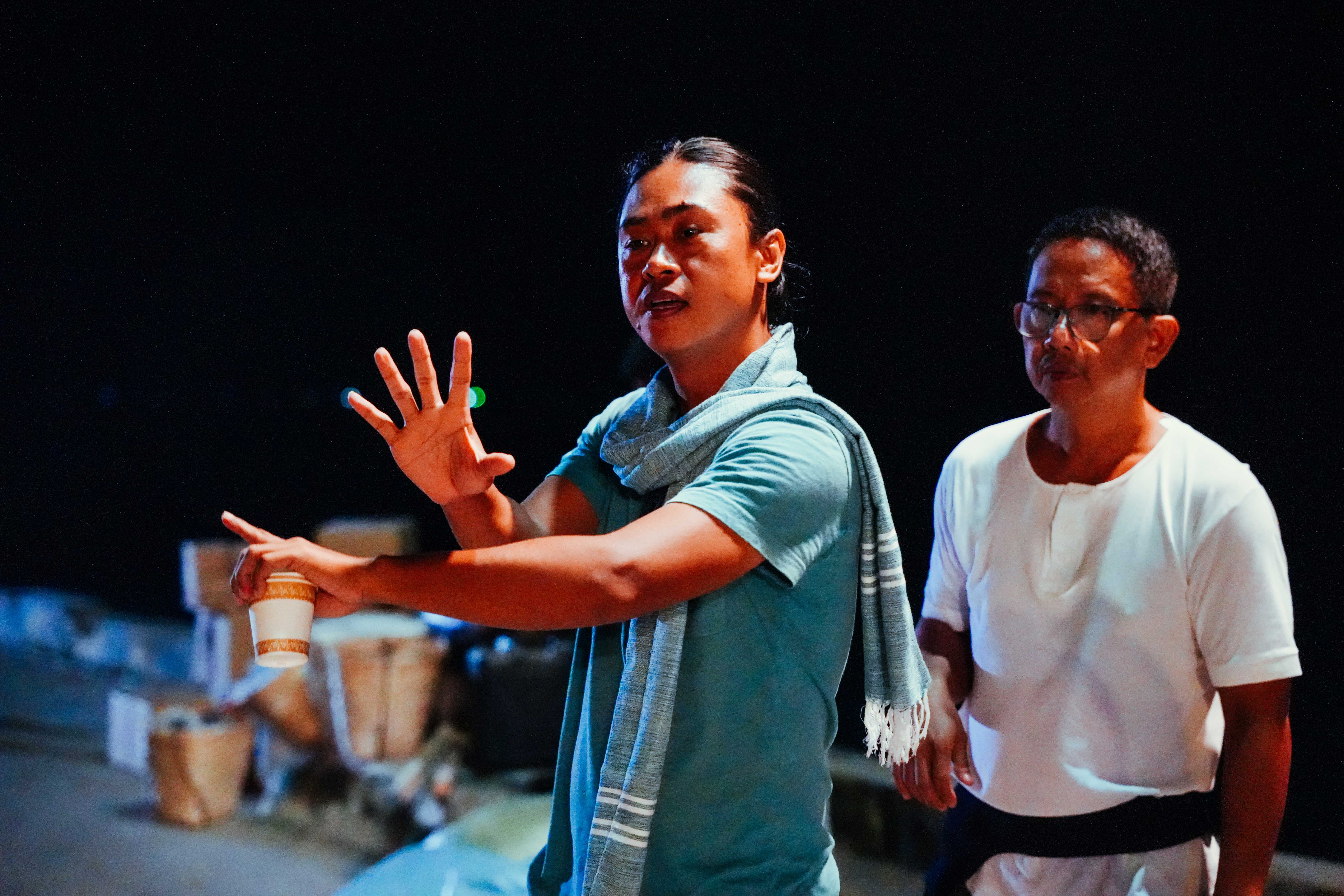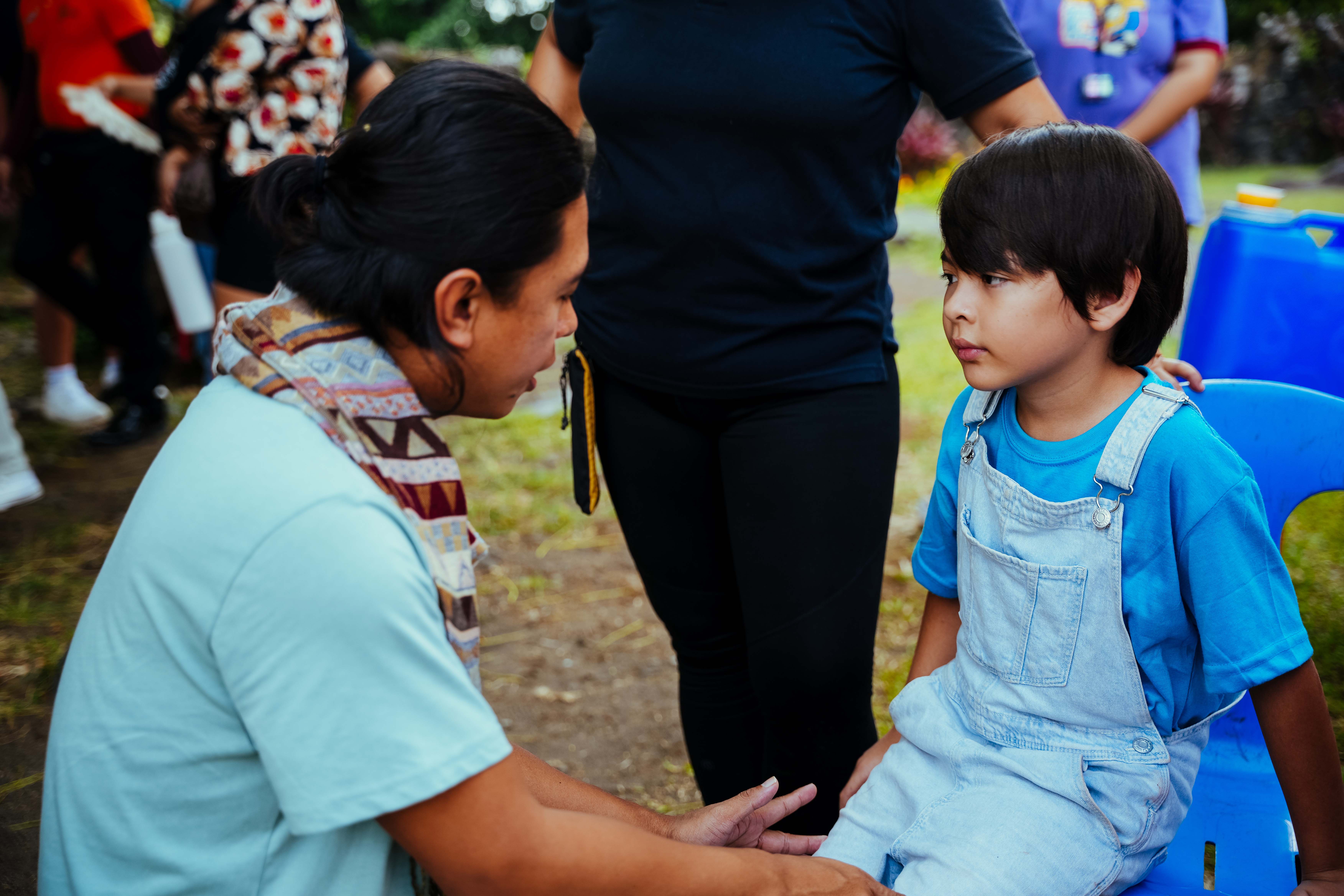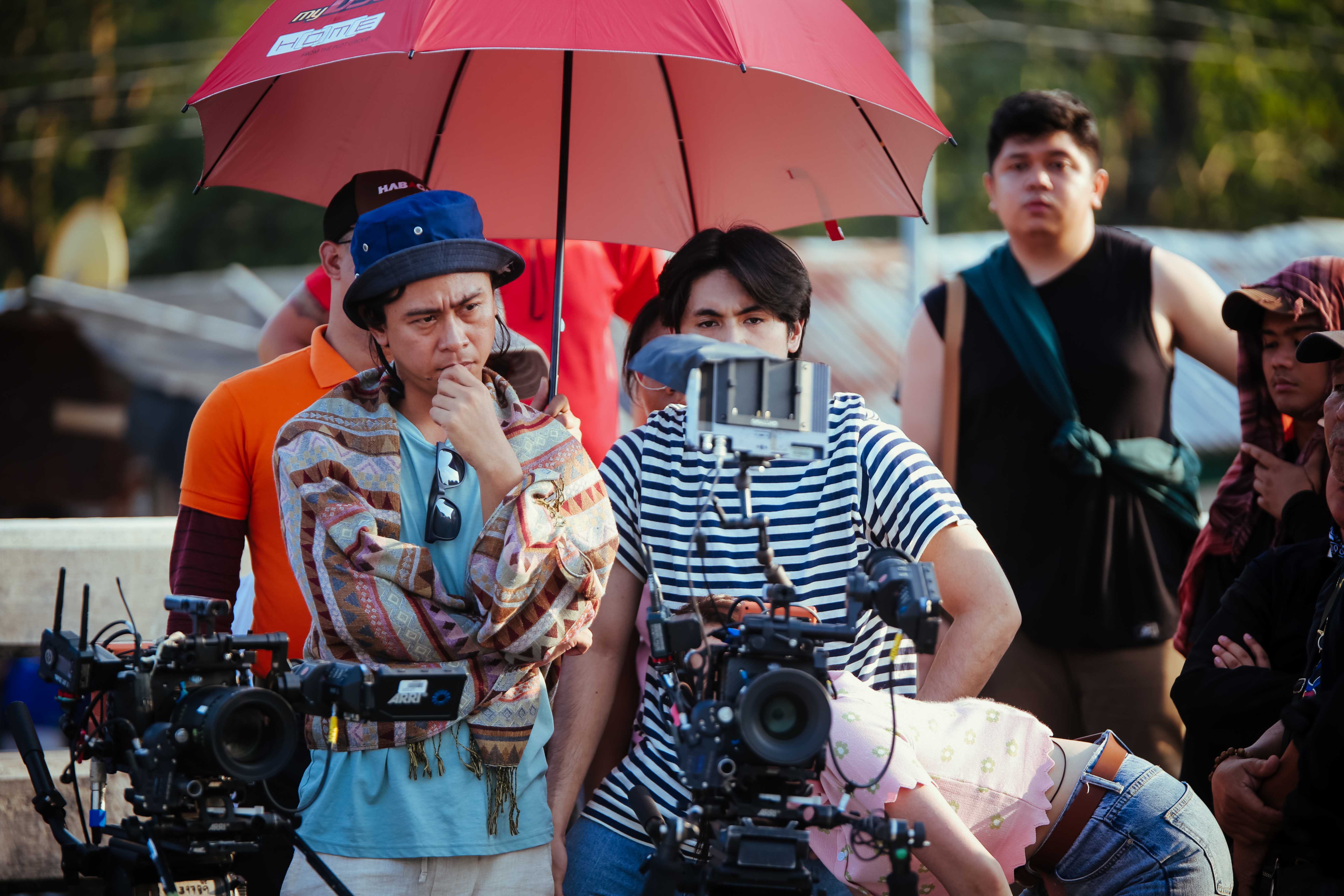Zig Dulay
and the magic of real life
This Zig was a huge fan of films across every genre, and grew up dreaming of writing stories and sharing them with the world.
Across every version of Zig—whether as a director, writer, artist, student, or short-time NGO employee—is a man who hails from Isabela. He is the 10th out of 11th children, who was raised by his now-deceased mom Ester, after losing his father while he was still in elementary school. Zig is a loving son, and a hardworking student both in school and in life.
He doesn’t have a famous last name, or at least he didn’t back then. He just wanted to write. He had goals in mind and wanted to make them happen. Looking at his life story now, it is a fact to say he started from scratch. He is the epitome of the term “self-made.”
And above all, he is a brave soul.
Like his characters, Zig has an origin story that is composed of several different layers and a plot that is never smooth, but always brings him right where he is supposed to be.
And like his latest film “Firefly,” Direk Zig is living out his own magical reality.

Zig was somebody interested in writing and grew up wanting to pursue it as a career. Back in high school in Isabela, he was a sports writer for the campus paper and thought that a life in the newsroom or reporting out on the field was where he was headed.
The young man ended up taking journalism at the University of the Philippines in Baguio.
He enjoyed journalism and studying in the Summer Capital, but one class pretty much changed Zig’s direction.
“Nung third year kami, nagkaroon kami ng scriptwriting class, na-enjoy ko siya,” Zig told GMA News Online with a sense of nostalgia in his eyes. He had just finished a promo shoot for “Firefly” at a Quezon City studio.
He recalled himself thinking, “naku, ito pala ‘yung gusto kong gawin.”
[In third year, we had a scriptwriting class, which I enjoyed. I realized, this was what I wanted to do.]
Eager to learn more, Zig started reading scriptwriting books, including Ricky Lee’s iconic manual, “Trip to Quiapo.”
“Kapag may ginagawang short films kami dun sa klase, ako lagi ‘yung writer,” he continued. “Nag-decide ako na after kong grumaduate, magiging writer ako ng pelikula. Parang natuwa ako sa pagsusulat eh.”
[Whenever we did short films in class, I was always the writer. I decided I’ll become a writer for films after graduation. I enjoyed writing.]

The first challenge was working through his days as an Iskolar ng Bayan. Zig and his family were able to get by, but finances were their biggest problem. By the time he rolled into his second year, Zig was already supporting himself. Thankfully, a student allowance was included in his tuition bracket but to make ends meet, he started working.
“Nung nag-aral ako ng college, kasi wala na silang mapapadala sa akin, pinapauwi nila ‘ko ng probinsya. Mag stop [daw] muna ‘ko ng pag-aaral. Eh ako, syempre may pangarap ako. Sabi ko, nandidito na ako.
“Sabi ko, ipagpapatuloy ko ‘yung pag-aaral ko kahit hindi na sila magpadala. So nag working student ako,” he said.
[When I was in college, my parents couldn’t send money to me anymore. They were telling me to go back home and stop school. But I had a dream. I said I was already there anyway, so I’ll continue studying. They didn’t need to send money. I became a working student.]
Zig spent his Mondays, Wednesdays, and Fridays as a student assistant at UP. The rest of his week was spent as a young reporter for Sky Cable News in Baguio, wherein he would receive P80 per news item he covered.
Zig would get up at five in the morning, listen to the radio for news, list them down, and then get fetched by a driver and cameraman to the scene.
“Pupuntahan ko ‘yung balita tas papasok ako ng klase ng 10:30 to 12. Tapos after ng 12, hinihintay ako doon sa gate kasi 12 to 1, tatakbo kami sa studio kasi i-re-record mo ‘yung sinulat mo,” he recalled.
[I would go to work and then go to class between 10:30 to 12. And then I would wait before we would go to the studio to record what I wrote.]
Despite his hard work and determination, Zig was unable to march for graduation. “[Kasi] kailangan magbayad ng graduation fee, tapos mag-ba-Barong ka pa, dalawang beses may baccalaureate. [Ang] daming gastos,” he said.
“Hindi ko na pinagsisisihan pero kung babalikan ko lang, sana inilaban ko ‘yun kasi hindi nakita ng nanay ko na umakyat ako,” Direk Zig said through tears.
[There was the graduation fee, you needed to wear a barong. There were two baccalaureate masses. There were too many costs! I don’t regret it anymore but if I could go back to that episode, I wish I fought for it so my mom could see me go up the stage.]
“Hindi ko na siya pinapunta. Kasi kung aakyat pa silang Baguio kasama ‘yung kapatid ko, gastos pa ulit. As in walang wala [kami].”
[I didn’t let her go anymore because if they went up to Baguio with my siblings, that would be another cost. We had nothing]
After that, the aspiring artist made a promise to himself.
“Sabi ko kung ano man ‘yung pera ko, gagamitin ko nalang papunta ng Manila para maghanap ng work. So ‘yun ‘yung ginawa ko.”
[What money I had, I will use it to go to Manila to look for work. So that’s what I did.]
"Nawala na lahat ng plano. ‘Yung natira na lang sa ‘yo ay kung ano talaga ‘yung gustong sabihin ng puso mo."
WHEN HE FIRST MOVED TO MANILA, Direk Zig landed a job in public relations for a non-government organization. The pay was great, but when it later transitioned into becoming a political office, he left to honor his principles. “Nakikita mo talaga ‘yung corruption. Ayokong tumanda nang ganito.”
His next job was thanks to filmmaker and film historian Nick Deocampo, whom he was able to interview for the Fernando Poe Jr., documentary he did as his undergraduate thesis.
Zig messaged Nick—“kapal talaga ng mukha ko,” he said—and asked if he knew of any job openings. The cold call led to him to become a museum assistant for the Pambansang Museo ng Pelikula, owned by the Movie Workers Welfare Foundation (Mowelfund) in Quezon City. Deocampo was the head of Mowelfund at that time.
Then he became a production assistant for ABC Sports.
All these early experiences led Zig to the world of independent filmmaking, climbing the creative ladder.
“Pagpunta ko dito sa Manila, ‘yun na ‘yung hinahanap kong pwesto sa industriya—pano ako makakapagsulat. Tapos syempre, wala naman akong kakilala dito sa Manila, nag PA muna ako,” Zig said.
[When I came here to Manila, that was the job I was looking for in the industry — a writing job. And because I didn’t know anyone, I became a PA first.]
Soon, he learned about the workshops of the renowned film writer and director Armando “Bing” Lao. The workshop fee was P2,500. Even with an installment plan, Zig could not afford it.
So once again, “Nag lakas loob na ‘ko.” He messaged the filmmaker, telling him of his predicament: “Sir Bing, gusto ko talaga matuto, pero wala po akong pambayad.”
[I forced myself to be brave. I said, Sir Bing, I want to learn, but I don't have money to pay.]
The filmmaker replied, offering him his Sunday clinic, a special workshop. “Pwede ka pumunta, pero mag-PA ka,” Zig remembers Lao telling him.
He recalls the experience, how he would stay in a corner, answer the exercises, and pass them to Sir Bing. “Dun ako natuto,” he said, witnessing the likes of Brillante Mendoza taking part in the workshop.
After being a production assistant, Zig worked towards being a script continuity supervisor. He continued work as an assistant director, production designer, and cinematographer, until he eventually reached his dream of being a screenwriter.
When Sir Bing referred him to director Jeffrey Jeturian to write for him, “[tumaas] ‘yung tiwala ‘ko sa sarili ‘ko.”
“Jeffrey Jeturian,” he said. “Institusyon na yan eh.”
[My belief in myself increased. Jeffrey Jeturian. He's an institution.]
He would go on to write for the likes of Law Fajardo, Armando ‘Bing’ Lao, Doug Quijano, and took the experience as an opportunity to learn even more.
“Lahat sila na nakikipag-collaborate ako, parang natututo ako. Tapos nakikita ko kasi sila, pumupunta ako sa set eh. Tas doon ako nangarap na, ‘try ko kayang mag-direct.’”
[I learned from everyone I collaborated with. I saw them, I went to set. That's where I began to dream: what if I become a director?]

Direk Zig’s first major foray into filmmaking was the short film “Missing,” which was about a desaparecido, an abducted man who went missing during the Martial Law period.
Part of the 2013 Cinemalaya Independent Film Festival, “Missing” received lukewarm reception, which somewhat ruffled the director’s feathers.
“Hindi siya masyadong gusto ng mga tao,” Zig said. He remembered thinking to himself, “Shet, hindi yata ako para dito.”
[People didn't like it. I thought, sh-t, I don't think I was made for this.]
But life had other plans.
“Missing” won a Gawad Urian for Best Short Film in 2014, in the same year he lost his mom.
“Para sa mga nawala,” he opened his acceptance speech when he went up on stage to accept his trophy.
He looked back, “Tas bigla kong naisip ‘yung nanay ko. Tapos umiyak ako—nakakahiya—dun sa stage.
“Iyak ako nang iyak pero inisip ko at that time, ang aga. Ang hirap makakuha ng Urian eh.”
[I remembered my mother. I cried on stage. I kept crying ... it's hard to earn a Urian.]
Receiving an Urian, often considered the Philippines’ Oscar, became Zig’s motivation to continue to study directing and to stay in the industry.
He went on directing the films he wrote, a huge factor in creating who Direk Zig really is: a self-made artist.

Among the themes he tackles are politics, society, reality, womanhood, and motherhood, inspired by what he sees in reality. In fact, “Bambanti,” the 2015 film also starring De Rossi, is inspired by a true story.
The film follows a maid and her son, played by Micko Laurente. The son is accused of stealing the expensive watch of his mother’s rich employer and their lives take a turn.
“Ako ‘yun nung bata ako,” Zig said. “Nung pinagbintangan akong nagnakaw ng relo, ang daming nangyari. Hindi ko ninakaw, pero pino-push [nila] kasi mayaman [sila].”
[That was me when I was a kid. When I was accused of stealing a watch. I didn't do it, but they insisted, because they were rich.]
De Rossi won Best Actress at the 2015 Sinag Maynila Film Festival. At the 2016 Star Awards for Movies, Laurente won Movie Child Performer of the Year and Zig won Best Director. It was also the Best Indie Movie of the Year.
These were hardly the last awards Zig would win. Looking through his immense body of work, most if not all of his pieces, whether in writing or directing, have won awards both in the Philippines and abroad.
Some of Zig’s award-winning scripts include “Posas” (directed by Lawrence Fajardo; Cinemalaya 2012 Best Film), “Ekstra” (directed by Jeffrey Jeturian; co-written with Antoinette Jadaone; Cinemalaya 2013 Special Jury Prize and Best Screenplay, 2015 New York Festivals Best Feature Film - Bronze), and “Kasal” (directed by Joselito Altarejos; Cinemalaya 2014 Best Film).
“Nag-conspire ‘yung universe,” Zig can’t help but say.
[The universe conspired.]
“Gusto ko lang palagi na alalahanin ... para hindi ako mawala. Tapos ‘di pa ‘ko nagkakamali.”
IF THERE'S ONE THING THAT DIREK ZIG IS GRATEFUL FOR, it is the fact that his mother, Ester, encouraged him to never stop dreaming.
Zig describes Ester as an “ambisyosa” who yearned to give her family everything.
His mom is similar to Elay, Alessandra De Rossi’s character in “Firefly,” the mother of TonTon, played by Euwenn Mikaell Aleta.
Like Elay, Ester was unable to go to school or have a proper job, but she was a strong woman who made sure to raise her kids well and give them the best lives she could offer.
Although they spent a decade away from each other — Zig spent most of his years in Baguio and later on in Manila — he looks back at their relationship with nothing but love.
“’Yung pagmamahal niya sa ‘ming mga anak niya, lalo na sa akin, hindi siya limiting. Hindi siya controlling. Parang [sinasabi niya], gawin mo kung ano ‘yung gusto mo,” Zig said.
[The way she loved us, she loved me especially, was not limiting. She was not controlling. She let us do what we wanted to do.]
“Malaki ‘yung tiwala niya sa akin. Kaya sobrang sentimental ko, emotional ko pagdating dun sa nanay ko kasi para akong layas eh,” he said. “Umuwi lang ako nung malapit na siyang mamatay.”
[She believed in me. That’s why I’m so sentimental and emotional when it comes to my mom. I was always away. I only went home when she was dying.]
Since her passing in 2014, Direk Zig has made it a point to go through life with the intention of making Ester proud. She has always been his number one fan.
He recalls a time Ester was in the hospital, and saw her son on “Kapuso Mo, Jessica Soho.” Zig was starting to make a name of himself back then. He had just won a Best Screenplay award for “Ekstra,” co-written with Antoinette Jadaone, and his mom was cheering him on.
“Sabi niya, ‘anak ko yan, anak ko yan.’ Super proud siya,” he said through tears.
“Gusto ko lang palagi na alalahanin,” Zig continued. “Gusto kong, ‘wag makalimutan ‘yan para every time na magkaroon ako ng project, gusto ko lagi niyang sinasabi yon: ’Maria Clara at Ibarra,’ anak ko may gawa niyan.’ ‘Firefly,’ anak ko may gawa niyan.’”
[She said, 'that's my son, that's my son.' She was so proud. I want to always remember, I want to not forget it, so that every time I have a project, I want her to always say that. 'Maria Clara at Ibarra,' my son made that. 'Firefly,' my son made that.]
He looks to his mom for guidance and inspiration, when accepting work, and to not veer off his path. Will this make my mom proud, he would ask himself. Will my mom want this for me?
“‘Yun ‘yung ginagamit kong guide para hindi ako mawala. Tapos ‘di pa ‘ko nagkakamali.”
[That is the guide I use to not get lost. I have never made a mistake with that guide.]

He admits to losing sight of his goal when she died. “Para saan na ‘yung ginagawa ko?” But he soon realized that living for her is a way of grounding himself.
“Kung ano ‘yung pinangarap ko sa kanya nung bata ako na magkakasama kami, tinutuloy ko pa rin,” Zig shared.
[What we dreamed of together when I was a child, I still strive for it.]
These include buying properties, like a condo in Manila, being able to fix their family home in Isabela with his income from “Maria Clara at Ibarra.”
“Kasi alam ko na ‘yun ‘yung gusto niya, na alam ko ‘yung pangarap niya,” he said while crying.
“Kung alam ko na hangga’t hindi ko nakakalimutan ‘yung pangako, ‘yung pangarap ko kasama ng nanay ko, ‘yun pa rin ‘yung laging nagiging guide.”
[Because I know that's hat she wanted, I know that was her dream. I won't ever forget our promise, our dream, that's still my guide.]
With his awards, challenges, and new projects, Zig feels that he has a lot of stories to tell his mom.
He wrote and directed a short titled “Letter to Nanay,” which he will turn into a full-length film in 2024.
It follows a mother and son who see each other again after she died, and they have a conversation filled with everything they want to say.
“Dahil ginagawa ko namang guide ‘yung nanay ko, lagi ko naman siyang nakakausap,” he cried. “Lagi akong thankful sa pag-ga-guide niya sa akin.”
He tearfully continued, “Syempre may mga times na nakakalimot ka.”
Zig cried, “Kung makikita ko siya ngayon, sasabihin ko, ito na ako ngayon. Natupad na ang mga pangarap namin. Sobra sobra pa.
“Kung makakausap ko siya, gusto ko lang sabihin—feel ko naman nakikita niya na lahat ng pinapangarap namin simula nung umpisa—nagawa ko na. At para ‘yun sa kanya.
“Feeling ko pag nakita ako ng nanay ko ngayon, tuwang tuwa ‘yun.”
[I always talk to her. I'm always thankful of her guidance. Of course, sometimes, I forget. If I could see her now, I would tell her, this is who I am now Our dreams have come true, above and beyond. If I could talk to her, I just want to say ... I did it. And it was for her. I feel that if she could see me now, she would be so happy.]
"Hinaharap mo ‘yung kinakatakutan mo. At sa pagharap na ‘yun, natuto ka."
ANOTHER LAYER IN ZIG DULAY'S determined, appreciative, and loving personality, is his bravery, one of the main themes of “Firefly.”
The film by GMA Pictures follows a kid, TonTon, who learns about an island of fireflies from his mother’s story, and goes on to search for it. Along the way, he discovers a lot about his own life.
“Firefly” marks a lot of firsts for Zig. It is the first time he is directing a film he did not write— the screenplay was written by Angeli Guidaya-Atienza. It is the first time he is doing a magic realist film. Plus “Firefly” is a mainstream movie.
“‘Yun ‘yung takot ko dito sa ‘Firefly,’” he begins. “It’s a formula, it’s a process na hindi ‘yung nakasanayan ko. Dun nagsimula ‘yung takot kasi hindi ako ‘yung nagsulat, ta’s hindi ko genre, tapos mainstream pa. Magkaiba gumawa ng mainstream sa indie, magkaiba sila ng proseso.”
[That's my fear with 'Firefly.' It's a formula, it's a process I'm not used to. That's where the fear started, because I didn't write it, and it's not my genre, and it's mainstream. In indie, it's a different process.]
After reading the script and hearing his hesitations, Nessa Valdellon, the Senior Vice President for GMA Pictures, told the director, “Pag tinanggap mo ‘to, ito na ‘yung pinaka magadang pelikulang magagawa mo so far.”
He took on “Firefly” as a creative challenge. “Nasa phase ako that time ng career, ng buhay filmmaker ko, na gusto kong gumawa ng something na hindi ako.”
“Para ma-check ko sa sarili ko kung kaya ko ba magkwento,” he added.
[I'm in the phase of my filmmaking career that I want to do something that's not me. So I can check with myself if I can tell a story.]

To prepare, Zig read and researched a lot, watched many magical realism films, and approached the project with his own magical superpower: the writer’s imagination.
He made sure to give the perspective of the innocence and self-discovery of the young kid, TonTon, with the film’s bright colors and nostalgic elements.
Then he leaned on “Firefly” being a “kwentong mag-nanay” and turned to his own mom, Ester. In the scenes that involved motherhood, he looked to his mother as motivation and inspiration.
Several scenes in “Firefly” are inspired by his past experiences. For one thing, TonTon feels his mother’s guidance throughout his journey, all the way until he grows up to be a writer.
His favorite among them, which he only added during shooting, is the scene wherein the adult TonTon gives a speech.
TonTon prepares many times to avoid mistakes. But in the middle of speaking, his voice cracks.
“Ito ‘yung moment na hindi mo na nako-control kung ano na ‘yung nangyayari kasi universe na ‘yung nag-ga-guide sa ‘yo,” Direk Zig explains. “Ta’s ikaw mismo, sunod ka na dun sa flow.”
“Nawala na lahat ng plano. ‘Yung natira na lang sa ‘yo ay kung ano talaga ‘yung gustong sabihin ng puso mo,” he said.
[It was the moment that I couldn’t control anymore what would happen. It’s the universe that’s guiding you. And you yourself, you can only go with the flow. Everything is out of the plan. All that is left is what’s in your heart.]

By learning more about the story’s heart and soul — and by leaning into it — “Firefly” helped Zig learn about his past and where he is now.
Accepting the project enabled him to face his trauma and fears — something incredibly on point for a movie about bravery — and by seeing himself in the movie, “Firefly” became an emotional experience for the director. Direk Zig ended up healing parts of himself through the film.
“Hinaharap mo ‘yung kinakatakutan mo. At sa pagharap na ‘yun, natuto ka. Tapos ‘yung mga natutunan mo na ‘yun, ‘yun ‘yung mas nag-i-ignite pa. ‘Yun ‘yung ginagamit mo para mas tumapang ka pa nang tumapang.”
“Mas tumapang ako kasi alam ko na kung ano man ‘yung mangyayari doon sa paggawa ng pelikula, alam ko na madami akong matututunan. Tas ‘yun ‘yung dadalhin ko—kung ano man ‘yung kahihinatnan ng gagawin ko.”
[You faced your fears, and by doing so, you learned. Then all these learnings continue to ignite you to become stronger and braver than you were before.].
But there’s yet another first for Direk Zig: It’s his first time being part of the Metro Manila Film Festival.
“Ngayon ko lang na-realize: Dati, MMFF viewer ka from the province. Tas ngayon, ikaw na gumagawa,” the director smiled.
“Sarap ng pakiramdam. Noon ko pa ‘to sinasabi, na I’m living my dream life,” he said. “Kaya sobrang thankful ako na lahat ng ginagawa ko ngayon, magkaroon man ng problema or hindi, alam ko na nabubuhay ako doon sa buhay na pinangarap ko dati pa.”
[I only realized it now. Before I was just an MMFF viewer from the province. Now, I’m the one making an MMFF film. It feels good. And I’ve been saying it before: I am living my dream life. That’s why I’m so thankful because everything I’m doing now, whether or not they are faced with problems or are smooth-sailing, I know I’m living the live that I only dreamed of before.]
The artist added, “Sobra pa nga ako dun sa pinangarap kong buhay, kasi ang gusto ko naman kasi talaga maging writer eh. Hindi naman siya ‘[writer] lang,’ kasi kuntento dapat ako dun eh kasi ‘yun ‘yung pinangarap ko para sa sarili ko.
“Tas ang binigay ng universe, na sobra pa doon.”
[This is more than what I dreamed of. I only really wanted to become a writer. And I’m contented being a writer because that’s what I wanted for myself. But the universe gave so much more.]
"Lahat tayo ay parang alitaptap, may kanya-kanya tayong mga ilaw na dala dala."
IF THERE'S ANYTHING THAT THIS NEW FILM TAUGHT HIM, and that he hopes to impart to viewers, it would be that we are all fireflies.
“Lahat tayo may kagalingan,” Direk Zig said. “Marunong kang magsulat, marunong kang mag welding, or whatsoever. Lahat ng pinakamagaling mo, pwede mong gamitin ‘yun para mag-grow.
“Para mas maging tao at para maging mas makatao sa kapwa mo.”
[We are all talented. You know how to write, you know how to weld, so on. Your talents, you can use them to grow and become a better person and become a better person to others.]
This served as Zig’s main motivation while working on “Firefly,” to hopefully bring that sense of kindness and courageousness to those who need it the most.
He also brings his own lessons, such as making his mother proud and honoring his parents’ legacy, to hopefully inspire others to do the same.
“Nahanap ko ‘yung sarili ko dun sa ‘Firefly.’ Na lahat tayo ay parang alitaptap, may kanya-kanya tayong mga ilaw na dala dala, gamitin natin ‘yung ilaw na ‘yun para ilawan ‘yung sarili nating daan at para ilawan din ‘yung daan ng ibang tao.
“Feeling ko ‘yun ‘yung purpose ko so far, sa ngayon. Paano mo gagamitin ‘yung sining mo para pagsilbihan ‘yung sarili mo, para pagsilbihan ‘yung kapwa mo.
“Lahat tayo mga alitaptap. ‘Yung ilaw na ‘yun, kung hindi ‘yung talent mo, hindi ‘yung kagalingan mo, ‘yung values na natutunan mo sa magulang mo. Iilawan ka nun sa lahat ng dadaan mo, at iilawan yan ng ibang tao.”
[I found myself in ‘Firefly.’ We are all fireflies. We have our own light we can use to illuminate our own paths or to help illuminate the paths of others. I feel like this is my purpose so far, my purpose right now. How do I use my art to serve not just myself but others? If it’s not your talent, it could be the values you learned from your parents. That will illuminate your path and others.]

In-depth special reports and features showcasing the best multimedia storytelling from GMA Integrated News.